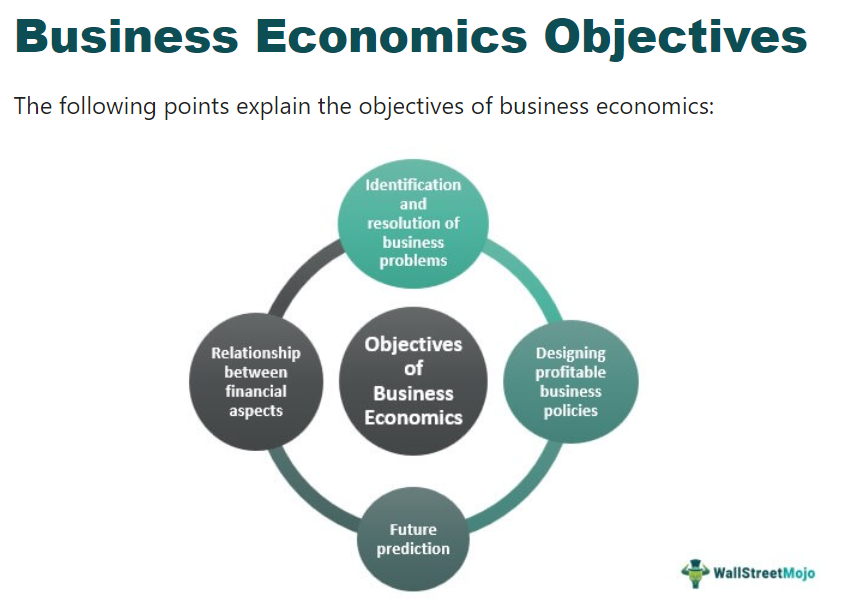Exploring the future of Business and Economics will impact international financial systems
Exploring the future of Business and Economics will impact international financial systems
Blog Article
Understanding Economic Concepts for Better Business Decision-Making
In the facility landscape of modern-day organization, a detailed understanding of financial principles can considerably enhance decision-making procedures. By checking out variables such as market frameworks and consumer behavior, companies can tailor their approaches to align with affordable dynamics and customer demands. Additionally, insights right into need elasticity and possibility expenses offer a structure for maximizing resource allotment. The application of these economic concepts typically reveals unforeseen challenges and chances that can redefine tactical strategies. What implications do these understandings hold for the future of company strategy?
The Fundamentals of Economic Theory
Economic concept works as the foundation for comprehending exactly how organizations and individuals make selections in the existence of deficiency. At its core, financial theory analyzes the allowance of minimal resources to satisfy limitless wants. This essential principle of shortage demands compromises, engaging decision-makers to evaluate the benefits and costs related to various choices.
The 2 primary branches of economic theory are macroeconomics and microeconomics. Microeconomics concentrates on private representatives, such as firms and customers, assessing their behavior and interactions in specific markets. It stresses principles like supply and need, cost flexibility, and market balance, which are important for understanding exactly how rates are figured out and exactly how resources are distributed.
Alternatively, macroeconomics examines the economic climate as an entire, addressing wider issues such as inflation, unemployment, and economic development. It gives insights into systemic sensations that influence all economic representatives, leading policymakers in crafting effective financial approaches.
Inevitably, a strong grounding in economic concept is important for efficient service decision-making. By recognizing the concepts of shortage, trade-offs, and market characteristics, companies can better make and navigate intricate atmospheres notified choices that boost their competitive advantage.
Trick Economic Indicators
Key financial signs act as crucial devices for evaluating the health and instructions of an economic climate, providing useful insights for service decision-making. These indicators are measurable steps that mirror the economic efficiency and can be categorized right into leading, delaying, and coincident signs.
Leading indications, such as customer confidence indexes and supply market fads, anticipate future financial activity, enabling organizations to anticipate adjustments on the market. Delaying indicators, like unemployment prices and corporate revenues, provide insights right into the economy's past efficiency, helping companies to review long-term patterns. Coincident indications, such as GDP growth and retail sales, change simultaneously with the economic climate, supplying a real-time snapshot of economic conditions.
Recognizing these indications enables services to make enlightened decisions relating to financial investments, source allocation, and tactical planning. An increase in consumer confidence might trigger firms to raise manufacturing in expectancy of greater need. Alternatively, rising unemployment rates might lead to a reevaluation of growth strategies. By carefully keeping track of these essential economic signs, organizations can navigate unpredictabilities and place themselves properly in the ever-changing financial landscape, eventually improving their decision-making processes and long-term view publisher site success.

Market Frameworks and Dynamics
Recognizing market structures and characteristics is essential for services aiming to flourish in affordable settings. Market frameworks, broadly categorized right into excellent competition, monopolistic competitors, oligopoly, and syndicate, considerably affect pricing techniques, item distinction, and competitive habits. Each framework presents distinct difficulties and possibilities that can dictate a firm's calculated instructions.
In perfect competition, many small firms contend, causing marginal pricing power and homogeneous products. On the other hand, in monopolistic competitors, companies separate their items, enabling some level of rates power while still encountering competitors. Oligopolies, characterized by a few dominant players, result in interdependent decision-making; firms should meticulously take into consideration rivals' responses to their actions. Finally, monopolies exist when a single firm regulates the marketplace, causing optimal pricing power but frequently drawing in regulatory scrutiny.
Recognizing these characteristics allows companies to anticipate market fads, adapt techniques, and maximize source allotment. In addition, acknowledging how external variables like innovation and policy influence these structures can enhance critical planning. By understanding market structures and dynamics, companies can make informed decisions, eventually boosting their competitive position and driving lasting growth.
Customer Habits Insights
Customer actions plays a critical function in shaping organization methods and outcomes. Comprehending how customers make purchasing decisions, their choices, and the elements influencing their actions you could look here can substantially enhance a business's capacity to meet market needs. Trick insights right into customer behavior can be originated from assessing demographics, psychographics, and behavioral patterns.
Group elements such as age, income, gender, and education and learning level offer a foundational understanding of target markets. Psychographics delve deeper, checking out customers' lifestyles, mindsets, and values, which can affect brand name commitment and item assumption. Behavior insights, such as buying frequency and action to promos, are very useful for tailoring marketing efforts.
Additionally, external factors like economic problems, social fads, and technical innovations additionally influence customer options. Throughout economic recessions, consumers might focus on crucial goods over high-end things, altering need patterns.
Using Economics to Strategy
Insights gained from customer habits contribute in formulating reliable service techniques. By leveraging economic concepts, services can better recognize market characteristics, optimize source allowance, and enhance affordable placing. Evaluating demand flexibility, for example, makes it possible for companies to adjust rates techniques to optimize income while remaining appealing to consumers.
In addition, comprehending market segmentation enables businesses to customize their offerings, ensuring they satisfy the specific demands and preferences of varied customer groups. Business and Economics. This targeted strategy improves customer contentment and promotes brand name loyalty

Including video game concept into calculated planning also gives insights right into affordable habits, allowing firms to prepare for competing actions and devise counter-strategies effectively.

Verdict
In conclusion, an extensive understanding of economic principles significantly enhances business decision-making. By analyzing market structures, assessing consumer behavior, and analyzing key economic indications, companies can create efficient techniques that line up with market demands.
In the complex landscape of modern-day organization, a thorough understanding of financial concepts can substantially improve decision-making processes.Leading indicators, such as customer self-confidence indexes and stock market trends, forecast future economic activity, permitting organizations to expect changes in the market. By closely monitoring these key financial indications, services can navigate uncertainties and place themselves efficiently in the ever-changing economic landscape, inevitably enhancing their decision-making procedures and long-lasting success.
By leveraging economic concepts, services read what he said can better recognize market dynamics, maximize source allocation, and boost competitive placing.In final thought, a comprehensive understanding of financial principles dramatically enhances organization decision-making.
Report this page